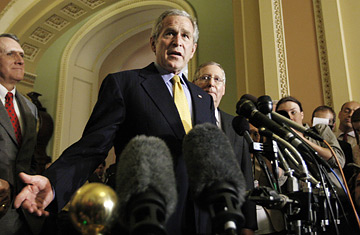
President Bush accompanied by, from left, Sen. Jon Kyl, R-Ariz., and Senate Minority Leader Mitch McConnell of Kentucky, speaks to reporters about immigration reform, June 12, 2007, on Capitol Hill in Washington.
President Bush may well be entering his lame-duck period, but he's not going there without a fight.
Just a couple of days after his rare visit to the Capitol, some signs are emerging that the Senate immigration reform bill he is pushing may not be dead just yet. Thursday night, a bipartisan coalition of Senators negotiated an agreement to bring the legislation back to the floor, possibly by next week. The sudden turnaround occurred after Bush shifted tactics, making an obvious overture to conservative critics by emphasizing the legislation's ability to strengthen the porous U.S./Mexico border.
The President hammered that point home Thursday morning during a speech to the Associated Builders and Contractors at the Washington Hilton. "For decades, we have not been in complete control of the border," he said. "If you're worried about border security, you ought to be supporting this bill." He then announced his support of an amendment to the main legislation put forth by Sen. Lindsey Graham, a South Carolina Republican, and Sen. John Kyl, the Arizona Republican who has been the G.O.P's point man on the issue. The measure would immediately appropriate $4.4 billion toward border security and law enforcement, specifically surveillance towers, detention beds, and new fencing (though, as Bush took care to remind, "you can't fence the whole border").
White House Press Secretary Tony Snow said that the $4.4 billion would be paid back to the government through the fines and penalties levied on former illegal immigrants applying for a Z-visa, the first step in the process of obtaining legal residency. Snow characterized the funding as "a direct deposit right now on border security, a surge toward the border of people and technology."
This latest attempt to convert the bill's opponents comes as Democrats and Republicans both spent the past week volleying blame back and forth. After Senate Majority Leader Harry Reid, the Democrat from Nevada, pulled the bill from debate last Thursday night (following a failed attempt to end debate), Republicans pointed to that action as evidence of the Democrats' lack of genuine interest in the legislation. Democrats, on the other hand, complained the G.O.P had slowed down the bill's progress with a litany of amendments. Thursday night, however, the group of Senators that have shepherded this bill agreed to a limited list of about 20 amendments that they presented to Sen. Reid. In a short statement, Reid and Senate Minority Leader Mitch McConnell, a Kentucky Republican, said "We met this evening with several of the Senators involved in the immigration bill negotiations. Based on that discussion, the immigration bill will return to the Senate floor." The hope is to bring the legislation back for a vote next week after the current debate on the energy bill ceases.
At a press conference Thursday afternoon opposite the Capitol building, Sen. Mel Martinez appeared beside Democratic Senators Edward Kennedy of Massachusetts and Robert Menendez of New Jersey. A caravan of activists that had traveled from Los Angeles presented a million pro-immigration reform signatures to the trio. Sen. Kennedy made sure to make mention of two of the bill's main opponents, Jeff Sessions of Alabama and Jim DeMint of South Carolina. "I hope that my friend Sen. Sessions will sit down and read these letters," he said, motioning to several stacks of bound petitions at his feet. "I hope that my friend Sen. DeMint will sit down and read these letters."
"I'd ask if he's been answering his phone lately, because ours has been ringing off the hook for three weeks straight with calls running 99-1 against this bill," said DeMint spokesman Wesley Denton. DeMint himself stood firm. "I appreciate the effort to fund border security, but there's simply no reason why we should be forced to tie amnesty to it," he said in a statement, referring to the $4.4 billion allotment. "If the Administration was serious about fulfilling the border security promises, then this funding should have been supported all along, not offered at the last minute to attract votes to a bad bill."
Indeed, despite the slow march back to the Senate floor, immigration reform still has many obstacles to passage. Any number of amendments could serve as deal killers; Democratic supporters such as Sen. Menendez demand an emphasis on family reunification (the current bill prioritizes a merit-based point system based on skills above family ties); and there's still the House to worry about. Rep. Grace Napolitano, a California Democrat and member of the Congressional Hispanic Caucus, maintained that "we're ready on the House side to proceed on a good, fair, and just immigration reform."
She may be ready, but the time for immigration reform is running out. "This will not get done in an election year," said Napolitano. "It'll just be a political football."
